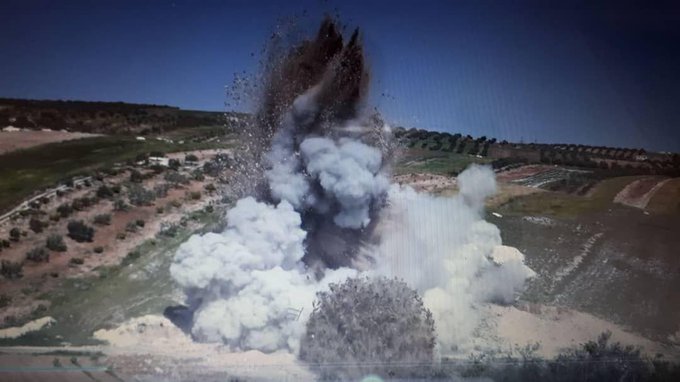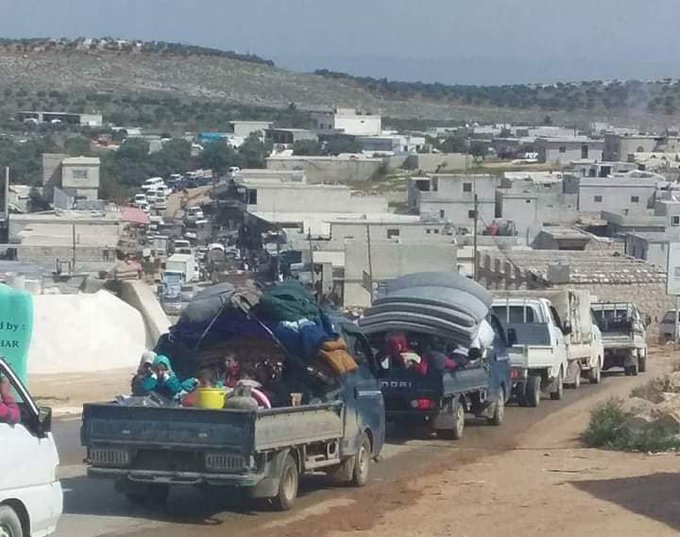
'This is the tale of a group of young rebels in Daraya. Daraya was besieged and bombed by Bashar al-Assad's regime from 2012 to 2016.
During the relentless four-year blockade, these 20-year-old revolutionaries challenged themselves to open a secret library in a Daraya basement, in order to save some 15,000 books that they dug up out of the rubble.
As the months went on, this paper agora gradually turned into a clandestine university. It became an open debate space, where chairs were sometimes pushed aside for dancing, where slogans were invented, newspapers were written, and ideas were born while guns relentlessly fired up above. Life, despite it all. An incredible breath of fresh air amid the Syrian chaos.
I was never able to visit them. Daraya was completely surrounded by the regime's army. But thanks to the internet, and the magic of Skype and WhatsApp, I created a special bond with these incredible book saviours.
Amid bombs and power cuts, I listened to and wrote down their stories. I probed their fears and dreams as I tried to make out their city's skyline.
Whether in the morning or at the dead of night, I listened to them tell me about their everyday life.
I remember what I thought back then, as I spoke to them, seeing the first images they sent over. They were young people who looked just like us, who wear Adidas T-shirts and washed-out trainers. They were funny, curious, and full of life … They were far off from the "terrorist" label that Bashar al-Assad insisted on giving them.
When night fell, they would watch Amelie on their laptops. They devoured Paolo Coelho's Alchemist. They were fascinated by Steven Covey's Seven Habits of Efficient People, while their city crumbled under the bombs falling from the sky (up to 80 a day).
Refusing to accept isolation, they even sent letters to the United Nations and to Francois Hollande.
They also wrote to me, the day after the November 13 attacks, to express their solidarity to the people of France.
There was Ahmad, the library cofounder.
Shadi, the citizen journalist who documented everything.
Hussam, the flirt.
Omar, the anti-Assad fighter who wouldn't stop reading.
And around 40 or so young people who accompanied them, bringing a fragile and threatened dream to life, day by day.
We see them tending to vegetable gardens to answer to the food shortages. Melting plastic to make fuel. After every lull, they tirelessly lift their heads up high once again.
One day, we see them building a football pitch where shells have fallen the day before. Another day, they are decorating the empty shells of destroyed houses with joyful graffiti. On yet another day, they have fun filming children making cakes out of earth, mocking the absence of flour.
I was struck by their resilience, by the collective solidarity that they never ceased to believe in. For four years, they resisted as a group. They braved explosions, the cold, power cuts, the lack of running water. Humour became their defence mechanism. Dignity became their best shield against barbarity.
I remember how during my first contacts with them I was touched by their fervent attachment to the democratic values of the early moments of the 2011 revolution … and to culture, which they defended like a survival instinct.
We could feel their will to stay loyal to the pacifist spirit of one of their friends who was tortured to death by the regime. He had invited protesters in the first demonstrations to respond to the Syrian soldiers' bullets by offering them gifts of roses and bottles of water.
Despite the violence of the bombing, despite the Islamist temptation for some, these young people never ceased to answer to the unfailing barbarity of Damascus with the language of peace. They organised debates in which they promoted dialogue, always favouring discussion and listening over following a definitive plan. The obstination to build a political ideal based on respect and non-violence underlay everything they did.
This ideal was illustrated, for instance, by the peculiar choice to place the different Free Syrian Army battalions (anti-Assad forces) under control of civilians from the Local Council (contrary to other rebel cities, such as Homs or Aleppo).
I was constantly surprised by their ability to never renounce the hope of a better tomorrow. Defying fear and death, they intensified their creativity, embarking on new projects every day.
Daraya, the symbolic cradle of the anti-Assad revolt, was also peculiar in that it woke up well before the 2011 uprising. My informants told me that in Daraya, civic engagement goes back to the 1990s. At the time, a group of dissidents started a number of citizen initiatives on the quiet - anti-corruption campaigns, anti-smoking campaigns, etc - in order to raise awareness among the inhabitants about claiming their rights.
These revolutionary pioneers transmitted a kind of civil disobedience to Ahmad, Shadi, Hussam, Omar and all the young people of the new generation.
Their relationship with books also says a lot about their attachment to democracy and the pluralist ideal. Saving books also meant saving their heritage, preserving a few traces, however minute, of their past and their cultural identity that were getting erased under the daily effect of bombs.
It meant resisting the regime, along with its ideology and propaganda.
One of the principles for their secret library involved writing the owners' name into the first page of each book, in the hope of giving it back once the war was over. Much to my surprise, I discovered that their paper refuge had precise rules: opening hours, return dates to be respected … They said it was a way to introduce some order into the chaos of their everyday lives.
When all they had left to eat was a daily soup made of nothing but leaves, reading became their spiritual food.
In the library, they read everything they could get their hands on: theology books, political science books, novels, American-style self-help books. As the months and years went by, they became fascinated with the Tunisian 14th-century sociologist Ibn Khaldoun, devoured the poems of Palestinian Mahmoud Darwish, took interest in Mustafa Khalifa's Shell, discovered Victor Hugo's Les Miserables, as well as Shakespeare's plays.
Surrounded by tanks, with no escape, they took refuge in their books. When the bombs went quiet, their fighter friends would sneak away from the front lines to come and read with them. They read to stay human, to not succumb to madness. They read to escape. To keep a door open onto the world. To continue learning. Reading was their weapon of mass instruction.
Towards the end of August 2016, the small group of friends was forced to evacuate Daraya within 24 hours, along with its 7,000 last resistors (the city originally numbered 250,000 inhabitants). They fled after having been through hell: hunger, explosives, chemical weapons, and, towards the end, a series of Napalm attacks that set fire to the city's only hospital.
Delocalised to the Syrian province of Idlib, on the border with Turkey, 300km north of Daraya, they had to abandon their cavern of books, their graffiti and their broken dreams, against their will. When they left, the regimes' soldiers quickly plundered their collection.
After a few months, some of them decided to cross the border. Shadi wanted to get medical treatment for his injured hand in Istanbul. Hussam went to join an NGO that was operating from Gaziantep.
Of course, we met up. It strangely felt like we had just seen each other yesterday. But direct contact added an extra dimension to their story. I remember sitting with Chasi in a cafe, watching him unwrap a plastic bag filled with dozens of hard discs full of last-minute images of Daraya … I can still picture Hussam telling me that he was renouncing his pseudonym to take back his old name, Jihad. After four years of forced confinement, he was planning to get married, to travel, to go elsewhere.
That's when I understood that this story, their story, was not over. It continued through the images, through all of the unedited videos of the blockade reported by Shadi to Istanbul, that I watched in great detail. It lived on through the burning desire that they felt to reunite. To consolidate a friendship that had been forged under the bombs.
Mainly, it continued through their wish to keep the Daraya flame and the library dream going. Ahmad recently inaugurated a library bus in Idlib in Syria, where he chose to stay, a bus that continues to deliver books to women and children on site to this day.'


